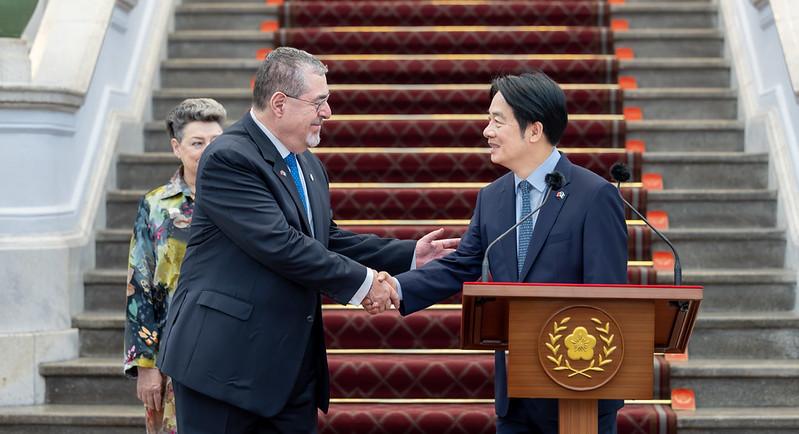President William Lai (賴清德) met with Guatemalan President Bernardo Arevalo at the Presidential Office in Taipei with full military honors.
The two signed agreements, including a memorandum of understanding (MOU) that would boost cooperation in the semiconductor field to increase Guatemala’s microchip capabilities and an MOU to establish a framework for political consultations, which would ensure regular, strategic coordination on key issues.
The two countries would continue to build a mutually beneficial partnership in the face of mounting global challenges, Lai said, adding that the agreements would create new opportunities for cooperation.

Photo courtesy of the Presidential Office
Arevalo, accompanied by his wife, and foreign and economic ministers, arrived in Taiwan yesterday, his first visit to the nation since taking office last year.
Last year also marked the 90th anniversary of diplomatic ties between Taiwan and Guatemala, one of Taiwan’s 12 UN-recognized diplomatic allies.
"Our two countries are geographically distant, but the ideals and values of the two peoples are closely intertwined," Lai said, adding that the long-standing partnership reflects their shared commitment to democracy, freedom and human rights.
Ties have grown closer in the past few years, bringing a multitude of successes as cooperation expanded and diversified in the fields of health and sanitation, education and culture, science and technology and economic trade, he said.
Taiwan would continue to work closely with Guatemala to provide youth exchange programs and scholarships to foster exceptional talent in science, technology and communications, he added.
Lai encouraged Taiwanese businesses to invest in Guatemala and utilize its strategic location, natural resources and strong workforce to improve supply chain resilience and promote bilateral relations.
The delegation is to visit Hsinchu Science Park and the headquarters of Taiwan Semiconductor Manufacturing Co this week.
Guatemala last month sent a mission of 28 engineers to Taiwan for a three-week intensive training program in semiconductors.
This week's visit reaffirms the two nations’ close ties and marks “a new level” in the bilateral relationship focused on expanding economic cooperation, solidifying an economic trade partnership and investing in educational opportunities for the citizens of both countries, Arevalo said.
"On behalf of the people of Guatemala, I extend our hand to the people of Taiwan with the confidence that we will walk together along the path toward shared well-being, which we will make more profound and more comprehensive today," he said.
Additional reporting by Reuters

Chinese spouse and influencer Guan Guan’s (關關) residency permit has been revoked for repeatedly posting pro-China videos that threaten national security, the National Immigration Agency confirmed today. Guan Guan has said many controversial statements in her videos posted to Douyin (抖音), including “the red flag will soon be painted all over Taiwan” and “Taiwan is an inseparable part of China,” and expressing hope for expedited reunification. The agency last year received multiple reports alleging that Guan Guan had advocated for armed reunification. After verifying the reports, the agency last month issued a notice requiring her to appear and explain her actions. Guan

GIVE AND TAKE: Blood demand continues to rise each year, while fewer young donors are available due to the nation’s falling birthrate, a doctor said Blood donors can redeem points earned from donations to obtain limited edition Formosan black bear travel mugs, the Kaohsiung Blood Center said yesterday, as it announced a goal of stocking 20,000 units of blood prior to the Lunar New Year. The last month of the lunar year is National Blood Donation Month, when local centers seek to stockpile blood for use during the Lunar New Year holiday. The blood demand in southern Taiwan — including Tainan and Kaohsiung, as well as Chiayi, Pingtung, Penghu and Taitung counties — is about 2,000 units per day, the center said. The donation campaign aims to boost

The Kaohsiung Tourism Bureau audited six hotels in an effort to prevent price gouging ahead of Korean band BTS’ concert tour in the city scheduled for Nov. 19, 21 and 22 this year. The bureau on Friday said that the audits — conducted in response to allegations of unfair pricing posted on social media — found no wrongdoing. These establishments included the local branches of Chateau de Chine, Hotel Nikko, My Humble House, and Grand Hai Lai, it said, adding that the Consumer Protection Commission would have penalized price gougers had the accusations been substantiated. The bureau said the Tourism Development Act

BACK TO WINTER: A strong continental cold air mass would move south on Tuesday next week, bringing colder temperatures to northern and central Taiwan A tropical depression east of the Philippines could soon be upgraded to be the first tropical storm of this year, the Central Weather Administration (CWA) said yesterday, adding that the next cold air mass is forecast to arrive on Monday next week. CWA forecaster Cheng Jie-ren (鄭傑仁) said the first tropical depression of this year is over waters east of the Philippines, about 1,867km southeast of Oluanpi (鵝鑾鼻), and could strengthen into Tropical Storm Nokaen by early today. The system is moving slowly from northwest to north, and is expected to remain east of the Philippines with little chance of affecting Taiwan,